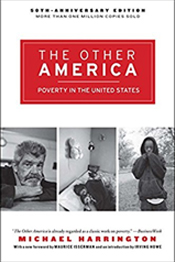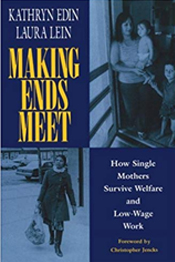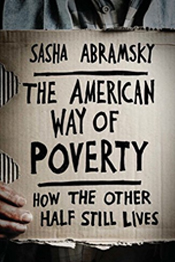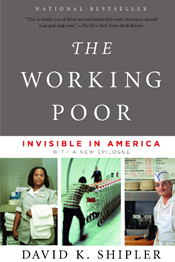Stories of Poverty
News Articles
- One Family's Story Shows How The Cycle Of Poverty Is Hard To Break
- 3 TVs and No Food: Growing Up Poor in America
- A father’s initiative Paul Gayle had no job, no money, a new baby and 16 lessons from the Obama administration to teach him what to do next
Books
 |
Millions of Americans work full time, year round, for poverty-level wages. In 1998, Barbara Ehrenreich decided to join them. She was inspired in part by the rhetoric surrounding welfare reform, which promised that a job -- any job -- can be the ticket to a better life. But how does anyone survive, let alone prosper, on $6 an hour? To find out, Ehrenreich left her home, took the cheapest lodgings she could find, and accepted whatever jobs she was offered. Moving from Florida to Maine to Minnesota, she worked as a waitress, a hotel maid, a cleaning woman, a nursing-home aide, and a Wal-Mart sales clerk. She lived in trailer parks and crumbling residential motels. Very quickly, she discovered that no job is truly "unskilled," that even the lowliest occupations require exhausting mental and muscular effort. She also learned that one job is not enough; you need at least two if you intend to live indoors. |
 |
In Evicted, Princeton sociologist and MacArthur “Genius” Matthew Desmond follows eight families in Milwaukee as they struggle to keep a roof over their heads. Hailed as “wrenching and revelatory” (The Nation), “vivid and unsettling” (New York Review of Books), Evicted transforms our understanding of poverty and economic exploitation while providing fresh ideas for solving one of 21st-century America’s most devastating problems. Its unforgettable scenes of hope and loss remind us of the centrality of home, without which nothing else is possible. |
 |
When Michael Harrington’s masterpiece, The Other America, was first published in 1962, it was hailed as an explosive work and became a galvanizing force for the war on poverty. Harrington shed light on the lives of the poor—from farm to city—and the social forces that relegated them to their difficult situations. He was determined to make poverty in the United States visible and his observations and analyses have had a profound effect on our country, radically changing how we view the poor and the policies we employ to help them. |
 |
Welfare mothers are popularly viewed as passively dependent on their checks and averse to work. Reformers across the political spectrum advocate moving these women off the welfare rolls and into the labor force as the solution to their problems. Making Ends Meet offers dramatic evidence toward a different conclusion: In the present labor market, unskilled single mothers who hold jobs are frequently worse off than those on welfare, and neither welfare nor low-wage employment alone will support a family at subsistence levels. Making Ends Meet is a realistic look at a world that so many would change and so few understand. |
 |
Jessica Compton’s family of four would have no income if she didn’t donate plasma twice a week at her local donation center in Tennessee. Modonna Harris and her teenage daughter, Brianna, in Chicago, often have no food but spoiled milk on weekends. After two decades of brilliant research on American poverty, Kathryn Edin noticed something she hadn’t seen before — households surviving on virtually no cash income. Edin teamed with Luke Shaefer, an expert on calculating incomes of the poor, to discover that the number of American families living on $2.00 per person, per day, has skyrocketed to one and a half million households, including about three million children. Where do these families live? How did they get so desperately poor? Through this book’s eye-opening analysis and many compelling profiles, moving and startling answers emerge. $2.00 a Day delivers new evidence and new ideas to our national debate on income inequality. |
 |
Fifty years after Michael Harrington published his groundbreaking book The Other America, in which he chronicled the lives of people excluded from the Age of Affluence, poverty in America is back with a vengeance. It is made up of both the long-term chronically poor and new working poor—the tens of millions of victims of a broken economy and an ever more dysfunctional political system. In many ways, for the majority of Americans, financial insecurity has become the new norm. The American Way of Poverty shines a light on this travesty. Sasha Abramsky brings the effects of economic inequality out of the shadows and, ultimately, suggests ways for moving toward a fairer and more equitable social contract. Exploring everything from housing policy to wage protections and affordable higher education, Abramsky lays out a panoramic blueprint for a reinvigorated political process that, in turn, will pave the way for a renewed War on Poverty. |
 |
As David K. Shipler makes clear in this powerful, humane study, the invisible poor are engaged in the activity most respected in American ideology—hard, honest work. But their version of the American Dream is a nightmare: low-paying, dead-end jobs; the profound failure of government to improve upon decaying housing, health care, and education; the failure of families to break the patterns of child abuse and substance abuse. Shipler exposes the interlocking problems by taking us into the sorrowful, infuriating, courageous lives of the poor—white and black, Asian and Latino, citizens and immigrants. We encounter them every day, for they do jobs essential to the American economy. This impassioned book not only dissects the problems, but makes pointed, informed recommendations for change. It is a book that stands to make a difference |
